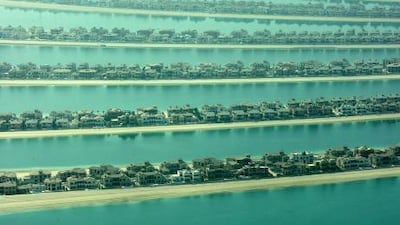DUBAI // Palm Jumeirah residents are calling for a crackdown on jet skis and motorboats racing through their waterways.
They say jet skis enter the frond areas at high speed and endanger the safety of swimmers and kayakers, despite rules banning them in narrow channels.
“Usually on weekends, young boys come from outside and enter the Palm where children and families are swimming or relaxing,” said a European expatriate who owns a villa on the Palm.
“We understand they want to have fun but they cannot see the swimmers because they are so fast. A few days back a child was screaming with fear in the water because of the big waves created by a jet ski rider.”
In April, the Dubai Maritime City Authority (DMCA) introduced rules for jet skis, including buffer zones. The rules say they can be launched from only a few beaches.
The Palm developer Nakheel` said it was working on the issue.
But jet skiers say signs and security patrols are needed so tourists riding jet skis know where to go.
“Palm Jumeirah’s security boats should stop people from going inside,” said Mohammed Al Muhairi, who rides a jet ski.
“They haven’t put any signs. Many jet skis are taken for rent or by hotel guests who may be using them for the first time and may not know where to go and where not to.
“I know because I was told two years back that it is not allowed to go in there. But now we hardly see patrol boats. There are only four to five entrances to the fronds and it is easy to stop jet skis.”
Jet skis are limited to areas between yellow buoys in Dubai Marina and beaches in Umm Suqeim 1 and 2 and Jumeirah 2 and 3.
Each area is adjoined by a 300-metre buffer to separate the machines from swimmers.
But residents said the rules were being ignored.
“There is plenty of space between the fronds and the crescent where they can ride but people are not allowed to use motors inside the fronds,” the villa owner said.
She said Nakheel officially banned boats and jet skis in the fronds and reserved the area for swimming, kayaks and stand-up paddle boards.
Calls to Nakheel’s security department have not stopped the problem, she claimed.
“We have been calling the security for the past two months. They say they will look into it but nothing has been done. Why take action after something happens?”
Another resident said the boats and jet skis come too close to the beaches.
“It is like the people riding them try showing off when they are on them,” she said. “Someone is bound to get hurt. They are dangerous and shouldn’t be allowed to be riding close to the beach.
“Perhaps the Government should consider putting up buoys in the area to prevent them along with the boats or completely ban them. They can be pretty noisy, too.”
She said Nakheel had a responsibility to make the Palm safe for residents.
“I feel public safety should be a huge concern for them. They should ensure their residents are happy and living comfortable as that was the concept originally sold to them.”
A spokesman for Nakheel said: “We are aware of this challenge and apologise for the inconvenience. We are working to resolve the issue.”
Mr Al Muhairi agreed with residents that rules must be respected by owners of jet skis and motor boats.
“They should stop because it is a private beach,” he said. “Jet skis and motor boats can create big waves.”
He urged residents to report those breaking the rules to police.
“Every jet ski has a number on the side,” Mr Al Muhairi said. “They can take down the number and give it to the police.”
The DMCA was unavailable for comment.

